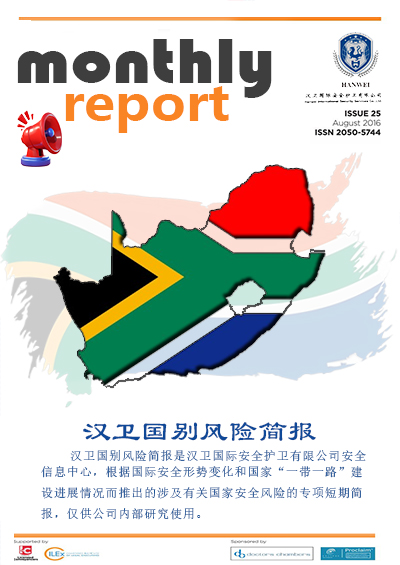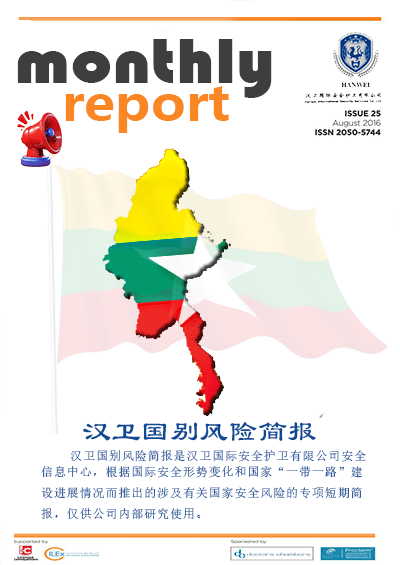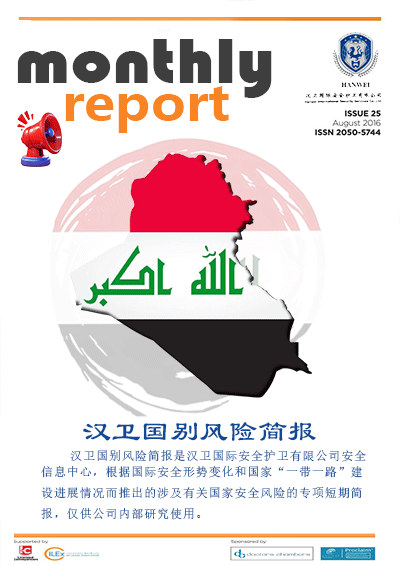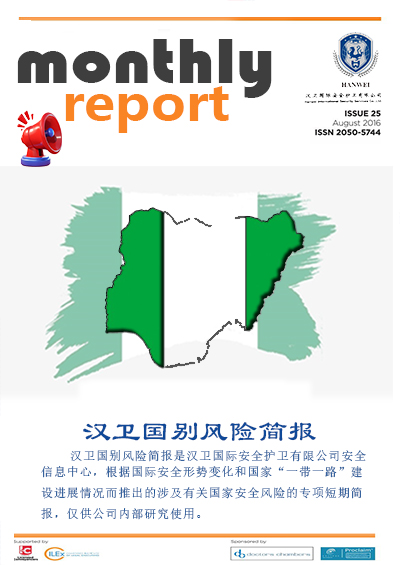Overview of Iraq's Security Situation in February
Researcher No. 006
According to the monitoring report of the security officer of Hanwei International stationed in Iraq and related media reports, our company will focus on the overall macro security situation in Iraq this month, mainly centering on three aspects: internal social issues, external conflict threats, and threats from terrorist organizations. It can be seen that the overall situation in Iraq tends to be stable, but it still faces many potential threats.
In 2025, Chinese enterprises in Iraq will demonstrate a positive outlook of all-round layout and deep integration and expansion. Chinese enterprises play an extremely important role in many key areas in Iraq, such as infrastructure innovation, efficient energy development and improvement of people's well-being. At the beginning of this month, the Iraqi Council of Ministers approved the proposal of the Social Services Commission and decided to award the design, construction, operation and maintenance rights of the South Karbala water Conservancy Project, which is worth up to 699.75 billion Iraqi dinars (equivalent to 534 million US dollars), to a Chinese company. On January 31st, the International Cooperation Company, a subsidiary of Shandong High-Speed Group, successfully won the general contracting project of the first phase of Sadr New City in Baghdad, Iraq (i.e., the "Sadr New City Project"). However, the intricate situation in Iraq has added numerous obstacles to the development of Chinese enterprises.
The first is internal social issues.
(1) Protest and demonstration activities
Recently, the Kurdistan region has been embroiled in a tense situation over salary issues, triggering large-scale social protests. Behind this incident lies the concentrated outbreak of the long-standing fiscal contradiction between the Reservoir government and the Iraqi federal government. The root cause of this protest is that the Kurdistan region is Mired in a severe salary crisis. From December 2024 until January 2025, the salaries of public servants have not been paid, which has led to a sharp increase in social dissatisfaction. The core of the dispute lies in the huge differences between the Reservoir Area Government (KRG) and the Iraqi Federal Government over the distribution of oil revenues. For a long time, this disagreement has not been properly resolved, which has led to an increasingly tight financial situation in the reservoir area and repeated arrears in the salaries of public servants, eventually triggering this protest.
Teachers in the Iraqi Kurdistan region have been escalating their protests in an effort to ensure the stable payment of public sector salaries by the Kurdistan Regional Government (KRG). On January 28th, due to the long-term arrears of civil servants' salaries by the Kurdish regional government, the teaching community in Sulaimaniya launched a protest and successively halted their daily teaching work. During this period, the fasting of 13 teachers for several weeks has drawn widespread attention from all sectors of society. Security forces also prevented demonstrators in Sulaimaniyah from traveling to Erbil to avoid further expansion of the protest. Furthermore, the progress of negotiations between the federal government and the reservoir government on budget allocation has also failed to allay the protesters' concerns.
On February 16th, protests by different groups broke out respectively in the three cities of Baghdad, Babylon and Basra in Iraq. Participants strongly demanded that the government create more job opportunities and improve working conditions by means such as blocking roads. People from various provinces who supported the demonstration of former graduates of the Ministry of Health were blocked when attempting to enter Baghdad. In Babylon, a large-scale demonstration also broke out in front of the provincial parliament building. The group of graduates who participated in it made demands to the government for job opportunities. In Basra, hundreds of cleaners participated in the protest. They blocked the main street in front of the former provincial government building and demonstrated in front of the Basra city hall, aiming to demand that their work contracts be converted to regular positions.
(2) Armed conflict
In the Rashid district in the south of Baghdad, a group of unidentified gunmen suddenly launched an attack on a house, causing casualties among local livestock. At present, security forces have intervened in the investigation and are making every effort to pursue the suspect. When the incident occurred, an unidentified person opened fire on a house in the Rashid District. The attack resulted in the immediate death of one cow and injuries to two others. After the incident, the security forces responded promptly, launched an investigation immediately, and made every effort to trace the identity of the shooter and determine the cause of the incident.
On February 22nd, a fierce armed conflict broke out in Shunafia District in the southern part of Dianya Province, Iraq, due to a land dispute, resulting in casualties. At present, security forces have promptly intervened and are making every effort to control the situation. According to sources from the Iraqi security department, in Shunafia County, fierce exchanges of fire broke out between the two sides due to a land dispute. The conflict resulted in the tragic deaths of two people and serious injuries to another two. After the incident, security forces promptly intervened, promptly controlled the situation on the spot, and successfully prevented the conflict from escalating further.
A sudden murder case caused by the intensification of social conflicts occurred in Erbil. After receiving the report, the police immediately activated the emergency response mechanism and promptly intervened to handle the situation. The case was triggered by a quarrel. During the conflict, the situation suddenly got out of control. The words and deeds of the three suspects quickly escalated into violent behavior, eventually resulting in the tragic fate of one person. After the incident, the police responded promptly and immediately arrested the three suspects in accordance with the law, successfully curbing the further deterioration of the situation.
(3) Bomb attack
On February 23rd, a sudden bomb attack occurred in the southern part of Kirkuk Province, injuring an official of the Iraqi security Patrol team. At present, relevant departments are conducting an in-depth investigation into the details of the incident, and the related situation is still being continuously followed up. According to security department sources, on Sunday, a bomb raided an Iraqi security patrol in the southern part of Kirkuk Province, injuring an official. After the incident occurred, the relevant departments responded promptly. On the one hand, they provided emergency treatment to the injured officials and made every effort to ensure their life safety. On the other hand, an investigation procedure was immediately initiated, vowing to thoroughly investigate the mastermind and underlying causes behind the bomb attack, in order to maintain regional security and stability and give the public a clear account.
A sudden bomb attack targeting educational administrators occurred in Diyala Province, Iraq. This atrocity immediately aroused strong indignation and condemnation from the local education union. Details of the incident show that an explosive device detonated near the residence of the principal of a middle school. Fortunately, as of now, there have been no reports of casualties. This attack seriously endangered the safety and daily life of educators and has drawn widespread attention from all sectors of society. After the incident, the trade union promptly expressed its stance, strongly condemning this terrorist act. The trade union has clearly demanded that the relevant departments immediately launch a comprehensive investigation, and it is imperative to arrest the perpetrator and severely punish him according to law.
The second is the threat of external conflicts.
(1) Turkey and the Kurdistan Workers' Party
This month, Turkey launched a series of military operations against the Kurdistan Workers' Party and the Syrian Kurdish armed group "People's Protection Force", resulting in the deaths of many armed personnel.
On February 2nd, the Turkish Ministry of Defense issued a statement saying that the country's security forces carried out operations in northern Syria and successfully killed 23 members of the Kurdistan Workers' Party and the Syrian Kurdish armed group "People's Protection Force". This operation dealt a heavy blow to the forces of the relevant armed forces in northern Syria.
On February 7th, the Turkish National Intelligence Organization (MIIT) carried out a precise military operation in the Hakurk region of Iraq. During the operation, Murat Kelehsu, a senior member of the Kurdistan Workers' Party, was successfully killed.
On February 9th, the Turkish Ministry of Defense issued a statement, saying that it had successfully "annihilated" four armed members of the Kurdistan Workers' Party (PKK) in northern Syria, emphasizing that this move was aimed at maintaining local security and stability.
On February 11th, the Turkish Air Force dispatched fighter jets to launch precise air strikes against the positions of the Kurdistan Workers' Party (PKK) in the village of Gargash on the slopes of the Gara Mountains in Duhok Province, northern Iraqi Kurdistan, with the aim of weakening the power of the organization.
On February 24th, the Turkish Ministry of Defense issued a statement saying that the country's armed forces carried out operations in Iraqi Kurdistan and northern Syria, successfully "annihilating" eight Kurdistan Workers' Party (PKK) militants.
Recently, the situation between the Kurdistan Workers' Party and Turkey has undergone a dramatic turn. The leader of the Kurdistan Workers' Party, Okalan, issued a ceasefire call and even called for the dissolution of the organization. This major decision immediately drew global attention. However, dramatically, shortly after Okaran's statement, the conflict between the two sides suddenly broke out, once again pushing the tense situation in this region to the forefront and drawing widespread attention from the international community. From late at night on February 27th to early morning on February 28th, in the areas of Kohelzi and Brawa villages in Duhok Province, Iraq, armed members of the Kurdistan Workers' Party (PKK) engaged in fierce exchanges of fire with the Turkish army. Both sides engaged in battle in the complex mountainous terrain, firing both light and heavy weapons, and sporadic explosions could be heard from time to time at the scene.
This series of military operations demonstrated Turkey's firm determination to combat the Kurdistan Workers' Party and related armed forces. The subsequent direction of its actions and changes in the regional situation have attracted much attention.
(2) The Trump administration revoked Iraq's exemption for energy imports from Iran
At the end of January, Trump decided to revoke Iraq's exemption from importing electricity and natural gas from Iran. Since the United States unilaterally withdrew from the Iran nuclear deal in 2018 and resumed sanctions against Iran, although it has granted multiple exemptions to Iraq for importing Iranian energy, the exemption period has been continuously shortened. This time, the cancellation of the exemption is undoubtedly another key move by the United States to strengthen its "maximum pressure" strategy against Iran, which has quickly drawn high attention from all sectors.
This incident will impact Iraq from multiple dimensions such as energy, economy, society and diplomacy, especially in terms of social stability. Iraq's power supply has long been dependent on Iran, with approximately one-third to 40% of its electricity coming from Iran. The sources include direct electricity imports and reliance on imported Iranian natural gas for power generation. However, with the lifting of the US sanctions exemption, Iran, fearing violation of sanctions, is highly likely to reduce or even cut off the supply of natural gas and electricity to Iraq. Iraq has a hot summer climate, with temperatures in some areas often exceeding 50 degrees Celsius. Power supply is of vital importance. Once the power supply is insufficient, frequent power outages will follow one after another. Power shortages have led to public dissatisfaction with the government. Competition among different regions and groups in energy distribution will also intensify, easily triggering social conflicts and increasing factors of social instability.
(3) Israel has launched a larger-scale military operation in the Kunaitra region of Syria
On February 9th, the Israeli army entered the area near the village of Ain Nuri in the northeastern part of the Kunaitra village of Khan Al-Naby and dismantled a military post that had been used by the Syrian opposition. On the 8th, an Israeli soldier opened fire, injuring a child in the town of Kunetaluvaye. Last week, the Israeli army chose to withdraw after occupying the Kuneitra Court and the provincial government building for more than 40 days. During the occupation, the Israeli military's actions were highly destructive. The official documents and records of the residents of Kunetra were damaged, and vehicles and motorcycles were also severely damaged. Since the outbreak of the Syrian civil war, Israel has continuously strengthened its military operations in the border area of the Syrian Golan Heights. This series of actions in Kuneitla undoubtedly make the regional situation more complicated, and the subsequent development trend has drawn much attention from the international community.
Israel's expansion of military operations in Syria is highly likely to lead to a deterioration of the security situation in Iraq's border areas and pose multiple threats to Iraq. As the scope of Israel's military operations continues to expand, the border areas of Iraq are the first to be affected. There are Shiite militia forces and other forces that have long been at odds with Israel active in Iraq. This makes it highly likely that Israel will expand its strike range to Iraq, especially targeting targets related to the armed forces supported by Iran. Once the situation develops to this point, Iraq's military facilities will be directly threatened, and the risk of being attacked and damaged will increase sharply, thereby weakening its military defense capabilities. Security in border areas will also be in turmoil, with residents' lives severely disrupted. Normal economic activities such as border trade will be forced to come to a standstill, and regional stability will face severe challenges. The evolution of this situation will undoubtedly pose a major threat to Iraq's national security and stability, and its subsequent development deserves continuous and close attention.
As Israel's military operations in Syria continue to escalate, the regional situation has become increasingly tense, which has brought a series of security challenges to Iraq, among which the problems caused by the rise of terrorist organization activities and the refugee wave are the most prominent. The chaos in the regional situation has provided an opportunity for terrorist organizations to take advantage. Extremist organizations may take this opportunity to frequently launch terrorist attacks within Iraq to achieve their political or military goals. These attacks not only threaten the lives and property of the Iraqi people and disrupt social order, but will also further weaken the foundation of stability in Iraq. Meanwhile, a large number of refugees have flooded into Iraq due to regional conflicts, posing a series of challenges to the country's public security. During the process of refugee resettlement, issues such as uneven resource allocation may trigger conflicts. Some refugee groups are difficult to manage and prone to criminal activities, which brings greater pressure to Iraq's already fragile public security environment and poses multiple threats to Iraq's social stability. The subsequent development of the situation is not optimistic.
It is recommended that Chinese-funded enterprises and individuals in Iraq take key precautions: First, closely monitor social dynamics and flexibly plan their operations and travel arrangements. Chinese enterprises need to keep a close eye on the latest developments of protests and demonstrations across Iraq, such as the protests in the Kurdistan region over salary issues and the demonstrations in cities like Baghdad driven by employment demands. Based on the real-time situation, rationally plan the operation of the enterprise. For instance, in areas and time periods where protests occur frequently, adjust the working hours of employees in a timely manner and suspend non-essential outdoor operations to avoid the risks of casualties and property losses caused by demonstrations and conflicts. Before traveling, Chinese citizens must fully understand the latest local situation, resolutely avoid areas with concentrated protest activities, and effectively reduce the possibility of accidents. Second, we will strengthen security measures to fully ensure the safety of personnel and assets. Given the frequent armed conflicts and the high security risks such as bomb attacks in Iraq, Chinese enterprises must increase security investment and improve security systems. On the one hand, high-definition surveillance cameras and reinforced protective fences and other security facilities should be installed in key areas such as enterprise office Spaces and project sites. On the other hand, professional security personnel should be assigned to employees, and targeted security training should be carried out to effectively enhance the ability to deal with sudden dangers. The residences of Chinese people should also enhance security protection and avoid going out alone at night. In case of any suspicious situation, you should immediately contact the local police or the Chinese embassy or consulate to ensure your own safety. Third, closely monitor energy and diplomatic developments and plan response plans in advance. The Trump administration's cancellation of Iraq's exemption for energy imports from Iran and the impact of Israel's military operations in Syria on Iraq's border security may both trigger a chain reaction on Iraq's energy supply and social stability. Chinese enterprises should closely monitor fluctuations in energy prices and supply stability, and formulate energy emergency plans in advance, such as expanding multiple energy supply channels and reserving a certain amount of energy materials, to ensure that their production and operation are not overly disrupted by energy shortages.




